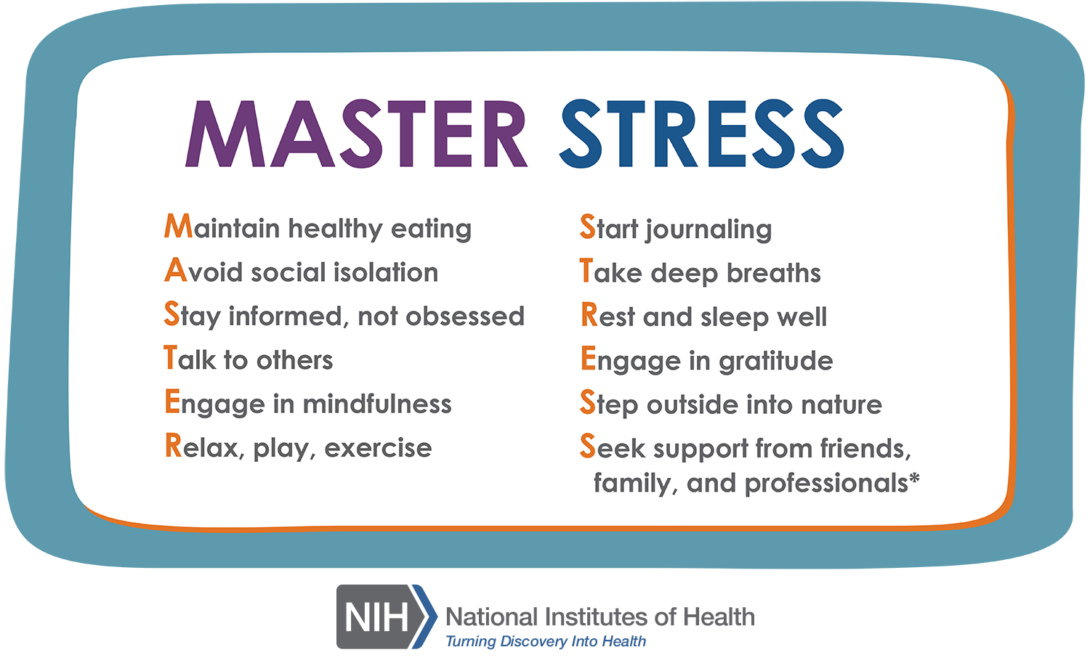Stress-Management Techniques
stress

Hello Flames,
We are officially in week 11 out of 16. This is the time when exams and projects are starting to pile up. This is also a period of time when many students feel overwhelmed or overburdened. We want to offer you a few de-stressing tips and techniques to help calm those racing, anxious thoughts and put you back on the path to success. View below.
Things you can do under 5 minutes to de-stress:
- Take a few seconds to breathe deeply and slowly. Taking deep breaths helps to calm any racing thoughts and emotions. It also allows you to refocus.
- Chew some gum. Some research shows chewing gum can help de-stress.
Practice 5-4-3-2-1 exercises. Start by sitting in a quiet spot and noticing things around you. Try to point out: 5 things you can see, 4 things you can touch or feel. 3 things you can hear, 2 things you can smell, and 1 thing you can taste.
Practice progressive muscle relaxation. Tip: view this video here on how to reduce stress and relax your mind and muscles through PMR. View video below. - Watch a funny video. Laughter is medicine. Laughing can help reduce feelings of stress and promote feelings of happiness and joy. Tip: watch this video compilation of pets doing funny things. Link here.
- Ask someone you love for a hug. Physical touch helps to release endorphins that promote high levels of happiness and low levels of stress. Tip: hugging your pet also releases endorphins that promote feelings of happiness.
- Write it all out. Avoid bottling up your emotions; instead, affirm your feelings and write them all out. Allow yourself to express your thoughts and feelings on paper. This exercise will “download” anxious thoughts and calm your brain.
- Reflect on your emotions. When we are overwhelmed or stressed, we often allow negative thoughts to sink in. However, remember to fact-check your thoughts to determine if they are really true. Sometimes a bad thought is just a bad thought.
- Change your perspective. As mentioned in the previous bullet, sometimes, we fill our heads with pessimistic thoughts. However, perhaps reevaluating the problem or situation with a new perspective might help.
- Recognize and accept how you are feeling and the situation you are in. Stop the vicious emotional cycle of rumination.
- Take a break. Grant yourself 5-10 minutes to do something you like and enjoy. Talk to a friend, do some stretches, or close your eyes and breathe.
- Drink a glass of water. Often during long study sessions, we sometimes forget to drink water. To avoid dehydration, consider reaching out for a fresh cup of water. It will help to energize your body and your brain.
Long-term stress-reducing strategies and tips:
- Eat a balanced diet. Eating a balanced and nutritious diet can strengthen your immune system and provide you with the energy you need to deal with stress. This is especially important as we move into the cold and flu season.
- Incorporate physical activity into your day. Physical activity is one of the best ways to help reduce stress, strengthen bones and muscles, and help reduce the risk of heart disease.
- Reassess your priorities and see if there’s anything you can remove. Removing things from your to-do list and delegating tasks is an essential skill that helps to reduce burnout and stress.
- Lean on your support group. Having a group of friends or family to help when times get rough can help lower feelings of loneliness and stress.
- Schedule a Wellness Coaching appointment with the Wellness Center. Schedule a wellness coaching session to speak with a Health Educator to discuss stress management techniques.
- Practice positive self-talk. Being kind, optimistic, and compassionate about yourself can help you manage your emotions and develop a healthier outlook.
Reduce Stress through Progressive Muscle Relaxation
Modified on November 09, 2022